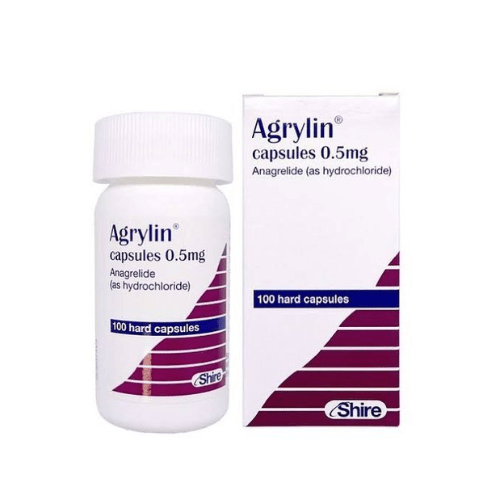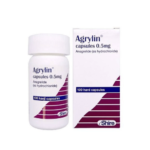About Agrylin
- Agrylin is a platelet-reducing agent which belongs to the family called hematologic, PDE-3 Inhibitors and Phospholipase A2 Inhibitors.
- Anagrelide is used to manage thrombocythemia in both the adult and pediatric patients.
- It is a condition often associated with myeloproliferative neoplasms. Its primary purpose is to lower abnormally high platelet counts, thereby reducing the risk of thrombosis (clot formation) and alleviating related symptoms, including thrombo-hemorrhagic events.
- Platelets are blood cells that help to form clots. Too many platelets can increase the risk of blood clots, which can lead to stroke, heart attack, and other serious health problems.
- Before taking Anagrelide for thrombocythemia, consult your doctor to discuss its benefits and risks.
- Anagrelide is not a cure but a long-term treatment to manage the condition and reduce clotting risks.
- Always use it under medical supervision and undergo regular blood tests to monitor platelet levels and potential side effects.
Strength:
Agrylin hard capsules are delivered in a strength of 0.5mg and 1mg, respectively, for oral consumption.
Recommended Dosage:
Follow your doctor’s prescribed dosage carefully. Do not take more or less than the prescribed amount. Take Anagrelide as instructed by your healthcare provider. It may be taken with or without food, but consistency in timing is important. Swallow the capsule whole with a full glass of water. Do not crush, chew, or open the capsule unless your doctor advises otherwise.
- The initial dosing for adults is either 0.5mg taken four times a day or 1mg taken twice daily.
- For pediatric patients, the starting dose is 0.5mg per day. It’s important to maintain the initial dose for at least one week before making any adjustments, and subsequent dosing should be titrated to achieve the target platelet counts.
- It’s crucial not to exceed a dose increment of 0.5mg per day within a week, and the maximum daily dose should not surpass 10mg or 2.5mg in a single dose.
- In cases of moderate hepatic impairment, the starting dose is 0.5mg per day.
Important:
Your doctor may advise you to do regular blood tests to monitor your platelet levels and adjust the dosage as needed. Attend these appointments as recommended. Be consistent with your medication schedule. Continue taking Anagrelide for the duration prescribed by your doctor, even if you start feeling better. Stopping the medication prematurely can affect your platelet levels.
Do not discontinue this treatment without the guidance of your physician. It’s essential to note that this medication should not be seen as a substitute for standard medical care. To ensure the safe and effective use of Agrylin, it is critical to provide a thorough medical history, including any allergies, infections, or existing medical conditions. Be sure to disclose all your current medications, including over-the-counter drugs and herbal supplements.
Warnings & Precautions
- Agrylin may lead to heart rhythm issues. Prior to treatment, all patients must undergo a cardiovascular evaluation, including an ECG.
- Continuous monitoring for cardiovascular effects during treatment is essential. Agrylin can impact the heart’s rhythm and should not be used if there are known risk factors for QT interval prolongation, congenital long QT syndrome, acquired QTc prolongation, or hypokalemia.
- Patients with liver problems may have an increased risk of QTc prolongation due to higher Agrylin exposure. Assess the benefits and risks carefully before starting the medicine in patients with mild or moderate liver issues.
- Adjust the dose of the medicine for those with moderate hepatic impairment. The use of Agrylin hasn’t been studied in severe hepatic impairment.
- Consider periodic electrocardiogram monitoring in patients with heart failure, bradyarrhythmias, or electrolyte imbalances.
- Be aware that some Agrylin -treated patients have developed pulmonary hypertension. Evaluate patients for signs of underlying heart and lung problems before and during AGRYLIN treatment.
- Combining Agrylin with aspirin may increase the risk of major bleeding events. Carefully assess the risks and benefits when considering simultaneous use of the medicine and aspirin. Monitor patients for bleeding, especially when taking other drugs known to increase bleeding risk.
- Lung issues, including allergic alveolitis, eosinophilic pneumonia, and interstitial pneumonitis, have been reported with Agrylin use. Symptoms may include progressive difficulty breathing and lung infiltrations. If suspected, discontinue AGRYLIN and seek evaluation.
- Agrylin is not recommended for pregnant women unless it is advised by a doctor. Because, the safety and efficacy is unknown in such a population. So, before starting the medicine, inform your doctor if you are pregnant or planning to become pregnant.
- Limited information is available regarding Anagrelide presence in human breast milk and its effects on breastfed infants, it has been detected in the milk of lactating rats.
- Due to the potential for serious adverse reactions, including thrombocytopenia, it is strongly advised to avoid breastfeeding during Anagrelide treatment and for one week following the last dose.
- Agrylin should be used with caution in patients taking other medications that may interact with the current medicine. Avoid Agrylin use with drugs that prolong the QT interval, and other medicine which interact with the current medicine such as cilostazol, milrinone, CYP1A2 inhibitors and inducers
Common Agrylin Side Effects:
- Headache
- Fatigue
- Diarrhea
- Nausea
- Bleeding risk
- Cardiovascular Toxicity
- Edema (swelling)
- Palpitations (fast heart rate)
- Abdominal pain
- Anemia (low red blood cell count)
- Thrombocytopenia (low platelet count)
- Ecchymosis (bruising)
- Lymphadenopathy (enlarged lymph nodes)
- Depression
- Somnolence (drowsiness)
- Insomnia (difficulty sleeping)
- Nervousness
- Amnesia (memory loss)
- Dehydration
Use in Specific Population
- Agrylin was studied in 18 pediatric patients aged 7-16 years with thrombocythemia. Adverse events in pediatric patients were similar to those in adults.
- In clinical studies, a significant portion of participants were 65 years and over, with some being 75 years and over. No notable differences in safety or effectiveness were observed in these older individuals compared to younger patients. While clinical experience hasn’t identified response differences, some older individuals may have increased sensitivity to Agrylin.
Storage and Handling
Before handling Agrylin capsules, ensure your hands are clean by washing them with soap and water. Avoid touching the capsules with wet hands. If you accidentally touch a capsule with wet hands, make sure your hands are completely dry before handling the capsule again.
- Store at 25°C (77°F) excursions permitted to 15-30°C (59-86°F).
- Store in a light resistant container.
- Protect Agrylin from light and moisture.
- Do not store Agrylin in the bathroom or in other areas where it may be exposed to heat or humidity.
- Keep Agrylin out of the reach of children and pets.
For the medicine procurement, we follow a simple four-step process.
- Enquiry about the medicine: When you request information about the medication you require, we will handle your data. Our Named Access Program Support team will contact you within 24 hours to assist.
- Verification Process: In our mission to help patients access medications that may not be approved or readily accessible in their home countries, Sansfro ensures the verification of medicine availability and approval. Additionally, we thoroughly review the patient’s prescription and medical information for accuracy and compliance.
- Sourcing the Medicine: Upon successfully completing the verification process, our team will initiate contact with our network of suppliers to source the required medication for you. Subsequently, our team works diligently to obtain the most favorable quotes for your medicines and oversees the processing of your order.
- Safe Delivery: We will coordinate the secure delivery of your consignment upon approval of the final quote. Our team of logistics specialists is available to provide consignment tracking assistance. Acknowledging that the Named Access Program industry is susceptible to unauthorized channels is essential. To uphold the safe and legal provision of medications, we rigorously adhere to Standard Operating Procedures.
For the importation of medication, we will require the following documents from the patient:
- An authentic prescription copy.
- A proof of identity document.
- Information about the healthcare provider in charge.
- A current residential address.
Once all these documents are provided, the Sansfro team will begin the import license application process. This license is a crucial requirement to facilitate the procurement of the necessary medication upon receiving government approval.
No news found.
About Sansfro
Sansfro is committed to bridging the healthcare gap. Our purpose is to bring hope and healing to patients suffering from rare diseases by linking them with life-saving treatments through our Named Patient Program. Join us in our quest for a better and healthier world.
Know More...FAQ'S
How does Anagrelide hydrochloride work to reduce platelet counts?
The exact way in which Anagrelide hydrochloride lowers blood platelet count is not fully understood. However, in laboratory studies using cell cultures, anagrelide was found to inhibit the expression of transcription factors like GATA-1 and FOG-1, which are necessary for the development of megakaryocytes, ultimately resulting in a decrease in platelet production.
How should Anagrelide hydrochloride be taken and monitored?
Anagrelide hydrochloride should be taken as directed by your healthcare provider. During treatment, your platelet count, blood counts, renal function, and liver function should be monitored regularly. It’s crucial to follow your healthcare provider’s instructions for dosing and monitoring.
What is the difference between Anagrelide hydrochloride and Agrylin?
Anagrelide hydrochloride and Agrylin are the same medication. Anagrelide hydrochloride is the generic name for the medication, while Agrylin is the brand name. There is no difference in the efficacy or safety of Anagrelide hydrochloride and Agrylin. Both medications are made by the same company, known as Shire US Inc.
What is the price of Anagrelide hydrochloride in India?
Anagrelide hydrochloride price in India depends on the product requirement. Request more details by contacting our Patient Support Team at (+91) 93157 05373 or help@sansfro.com.

Dr Anchal Aryan
Medical counselor
Patient Stories
Word Wide Delivery:
India, Andorra, Argentina, Australia, Austria, Azerbaijan, Bahrain, Brazil, Bulgaria, Cambodia, Canada, Chile, Colombia, Costa Rica, Croatia, Cyprus, Denmark, Dominican Republic, Estonia, Finland, France, Georgia, Germany, Ghana, Greece, Guatemala, Iraq, Ireland, Israel, Italy, Jamaica, Japan, Jordan, Kenya, Kuwait, Latvia, Lebanon, Libya, Lithuania, Malawi, Mexico, Montenegro, Nepal, Netherlands, New Zealand, Nigeria, Norway, Oman, Pakistan, Paraguay, Peru, Poland, Qatar, Romania, Saudi Arabia, Serbia, Singapore, Slovenia, Spain, Sri Lanka, Sweden, Switzerland, United Arab Emirates, United Kingdom, United States, Venezuela, Zimbabwe, Afghanistan, Albania, Algeria, American Samoa, Angola, Anguilla, Antarctica, etc.



